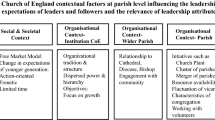Abstract
Over the last 20 years, researchers and practitioners have become increasingly interested in the transactional–transformational leadership paradigm. However, only a few studies have tested the validity of this approach to leadership concerning Christian pastors. Thus, two studies were conducted in Germany that explored the effect of transactional and transformational leadership of pastors on several outcome criteria. The results revealed that transformational leadership was positively associated with followers’ satisfaction with their pastor, their extra effort, their effectiveness, and their job satisfaction. In addition to this effect on followers, transformational leadership showed positive effects on worshipers’ satisfaction with the worship service. Implications of these results for theory and practice are discussed.
Similar content being viewed by others
Notes
Research Edition Translation performed by Dr. Jens Rowold on July 7, 2004. Translated and reproduced by special permission of the Publisher, Mind Garden, Inc., Redwood City , CA 94061, http://www.mindgarden.com from Multifactor Leadership Questionnaire. Copyright 1995, 2000 by Bernhard M. Bass and Bruce J. Avolio et al. All rights reserved. Further reproduction is prohibited without the Publisher’s written consent.
References
Balswick, J., & Wright, W. (1988). A complementary—empowering model of ministerial leadership. Pastoral Psychology, 37, 3–14.
Bass, B. M. (1985). Leadership and performance beyond expectations. New York: Free Press.
Bass, B. M., & Avolio, B. J. (2000a). Improving organizational effectiveness through transformational leadership. Thousand Oaks: Sage.
Bass, B. M., & Avolio, B. J. (2000b). MLQ multifactor leadership questionnaire. Redwood City: Mind Garden.
Bliese, P. D. (2000). Within-group agreement, non-independence, and reliability: Implications for data aggregation and analysis. In K. J. Klein, & S. W. J. Kozlowski (Eds.) Multilevel theory, research, and methods in organizations: Foundations, extensions, and new directions (pp. 349–389). San Francisco: Jossey-Bass.
Burns, J. M. (1978). Leadership. New York: Harper & Row.
Butler, D. M., & Herman, R. D. (1999). Effective ministerial leadership. Nonprofit Management & Leadership, 9, 229–239.
Druskat, V. U. (1994). Gender and leadership style: Transformational and transactional leadership in the roman catholic church. Leadership Quarterly, 5, 99–119.
Felfe, J., Tartler, K., & Liepmann, D. (2004). Advanced research in the field of transformational leadership. Zeitschrift für Personalforschung, 18, 262–288.
Hu, L. T., & Bentler, P. M. (1999). Cutoff criteria for fit indexes in covariance structure analysis: Conventional criteria versus new alternatives. Structural Equation Modeling, 6, 1–55.
Johns, G. (2001). The psychology of lateness, absenteeism, and turnover. In N. Anderson, D. S. Ones, H. K. Sinangil, & C. Viswesvaran (Eds.) Handbook of industrial, work and organizational psychology (pp. 232–252). London: Sage.
Judge, T. A., & Piccolo, R. F. (2004). Transformational and transactional leadership: A meta-analytic test of their relative validity. Journal of Applied Psychology, 89, 755–768.
Judge, T. A., Piccolo, R. F., & Ilies, R. (2003). The forgotten ones? The validity of consideration and initiating structure in leadership research. Journal of Applied Psychology, 89, 36–51.
Kline, R. B. (1998). Principles and practice of structural equation modeling. New York: Guilford.
Kröger, M., & Tartler, K. (2002). Multifactor leadership questionnaire: From the American to the German culture. In J. Felfe (Ed.) Organizational development and leadership (pp. 125–139). Frankfurt: Peter Lang.
Lichtman, S. L., & Malony, H. N. (1990). Effective ministerial style as perceived by denominational leadership. Pastoral Psychology, 38, 161–171.
Lowe, K. B., Kroeck, K. G., & Sivasubramaniam, N. (1996). Effectiveness correlates of transformational and transactional leadership: A meta-analytic review of the MLQ literature. Leadership Quarterly, 7, 385–425.
McGraw, K. O., & Wong, S. P. (1996). Forming inferences about some intraclass correlation coefficients. Psychological Methods, 1, 30–46.
Motowidlo, S. J. (2003). Job performance. In W. Borman, D. Ilgen, & R. Klimoski (Eds.) Handbook of psychology. Volume 12: Industrial and organisational psychology (pp. 39–54). Hoboken, NJ: Wiley.
Riggio, R. E., Bass, B. M., & Smith Orr, S. (2004). Transformational leadership in nonprofit organizations. In R. E. Riggio, & S. Smith Orr (Eds.) Improving leadership in nonprofit organizations (pp. 49–62). San Francisco: Jossey-Bass.
Rowold, J. (2004). MLQ-5X. German translation of Bass & Avolio’s multifactor leadership questionnaire. Redwood City: Mind Garden.
Rowold, J. (2005). Multifactor leadership questionnaire. Psychometric properties of the German translation by Jens Rowold. Redwood City: Mind Garden.
Acknowledgement
The author would like to thank Liv Harding and Kathrin Staufenbiel for constructive criticism on earlier drafts of this paper.
Author information
Authors and Affiliations
Corresponding author
Rights and permissions
About this article
Cite this article
Rowold, J. Effects of Transactional and Transformational Leadership of Pastors. Pastoral Psychol 56, 403–411 (2008). https://doi.org/10.1007/s11089-008-0121-6
Received:
Accepted:
Published:
Issue Date:
DOI: https://doi.org/10.1007/s11089-008-0121-6




